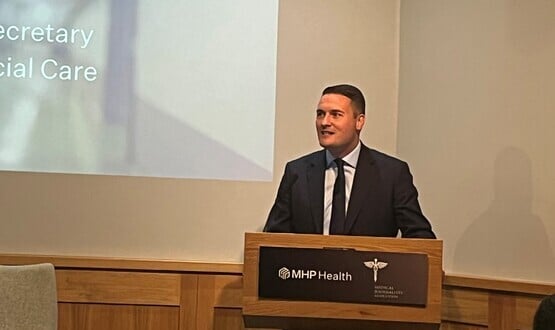First rule for start-ups: address a problem that needs solving – AI and Data
- 31 October 2023

Prospective AI start-ups need to ensure that they are targeting a problem that needs solving in order to succeed in a risk-averse NHS, panellists at a session on “Future gazing: the horizon of AI healthcare start-ups” told an audience at the inaugural Digital Health AI and Data conference Monday afternoon.
Speakers on the AI and Analytics stage discussed their own experiences with running or evaluating start-ups before an audience, including a healthy proportion of digital health entrepreneurs. They emphasised the importance of future testing the business case for innovations to make it more likely that they will be scalable.
“In the NHS, we are trusted with around £170 billion of taxpayer money,” Professor Joe Harrison, CEO of Milton Keynes University Hospital NHS Foundation Trust and national director of the NHS app told attendees. “Don’t expect us to grasp the latest thing and put it across the NHS. We won’t do it because we are not going to take that level of risk.”
The health service, Harrison said, “knows what it likes, and it likes what it knows. That said, do not give up because we are desperate to get good technologies into the NHS.”
Molly Gilmartin, a trained doctor and health tech investor at Albion VC, also stressed the need to “work out the problem you are solving for the person who is going to pay for it.”
Panellists agreed that the advent of AI is a unique moment in innovation but needs to be approached carefully.
“We need to make the impact real,” said Juliet Bauer, non-executive director at HelloSelf. She observed that the World Economic Forum has designated AI in healthcare as one of the main emerging trends, which she acknowledged is a “huge responsibility” for entrepreneurs and regulators alike. At the same time, she said, the technology has made progress in expanding both experience and access, through assisted navigation, triaging programs and chat efficiency.
Potential to use tech for preventative care
Bauer added that using AI to help the healthcare system transition from treatment to prevention and self-management will make it more cost-effective, but she worried that the “burden of proof” for technology may become too high.
Government mandates have aided the adoption of AI in certain technologies, such as virtual wards, said Dr Elina Naydenova, CEO and co-founder of Feebris.
“The problem is the more contextual problems that might be more important but need to fight for space,” she said. Following up on Bauer’s comments on preventative care, she reflected on the excitement about AI’s ability to aid predictive healthcare, adding that the healthcare system has been slow to respond to this potential.
“The system is not set up up to deal with that sort of response and the incentives are not there,” she said. “We are hoping the system will be set up for this in the next few years.”
Budget constraints in healthcare systems pose special challenges for start-ups, panellists agreed, making it especially important to hone business cases and business models. Gilmartin noted that in an era of capacity constraints, start-ups need to think about their value as a “single player”.
The panellists also discussed failure. Dr Keith Tsui, CEO and co-founder of Medwise.ai, was relatively sanguine about the prospect, noting that investors expect 90% of start-ups to fail, and that “helping them fail earlier” can ultimately provide a boost to entrepreneurs, rather than allowing them to go down an unproductive route.
Gilmartin observed that 90% of the start-ups she sees shouldn’t even be raising VC money. In contrast with B2B software companies that can raise money more easily because “all geographies behave in the same way”, health tech companies are very different. Start-ups in the health space are better advised to evaluate whether they have product market fit in their initial geography and how they can scale out.
“Raising £30 million is not the same thing as building an amazing business,” she said. “What are the milestones you need to reach and how much money do you need for that? Raising three times as much won’t help you get through the regulatory process three times as fast.”




